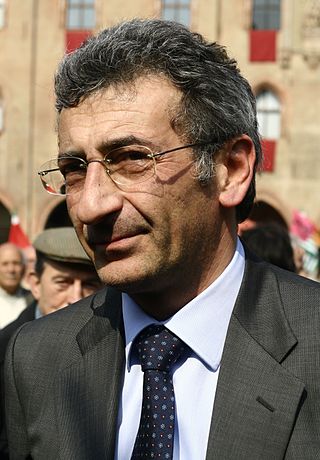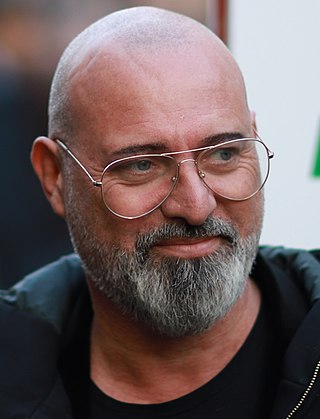| ||||||||||||||||
All 50 seats to the Regional Council of Emilia-Romagna | ||||||||||||||||
|---|---|---|---|---|---|---|---|---|---|---|---|---|---|---|---|---|
| ||||||||||||||||
| ||||||||||||||||
 |
|---|
|
The 2024 Emilia-Romagna regional election will take place in Emilia-Romagna, Italy, on 17 and 18 November 2024. [1]
| ||||||||||||||||
All 50 seats to the Regional Council of Emilia-Romagna | ||||||||||||||||
|---|---|---|---|---|---|---|---|---|---|---|---|---|---|---|---|---|
| ||||||||||||||||
| ||||||||||||||||
 |
|---|
|
The 2024 Emilia-Romagna regional election will take place in Emilia-Romagna, Italy, on 17 and 18 November 2024. [1]
In Emilia-Romagna, a new electoral law was approved by the Legislative Assembly in July 2014, abolishing the blocked list.
The voter can express one or two preference votes for the candidates on the chosen list; in the case of the expression of two preferences, these must concern candidates of different sex according to "gender preference" (under penalty of annulment of the second preference). As regards the election of the councilors, the law guarantees in any case at least 27 seats on the lists that support the elected president (majority prize), obtaining effects that are very similar to those of the list but acting on the provincial lists. The first 40 seats are distributed on a proportional basis. A seat is then attributed to the candidate for president who came second. The remaining 9 seats are assigned by majority method to the lists that support the elected president if these lists have obtained less than 25 seats with the previous procedure, otherwise the "prize" will be only 4 seats. If, at the end of these assignments, the majority lists have not obtained at least 27 seats, these will be guaranteed by removing some of the seats already assigned to the opposition lists.

A snap election was held in Italy on 13–14 April 2008. The election came after President Giorgio Napolitano dissolved the Italian Parliament on 6 February 2008, following the defeat of the government of Prime Minister Romano Prodi in a January 2008 Senate vote of confidence and the unsuccessful tentative appointment of Franco Marini with the aim to change the current electoral law. Under Italian law, elections must be held within 70 days of the dissolution. The voting determined the leader of Italy's 62nd government since the end of World War II. The coalition led by ex-Prime Minister Silvio Berlusconi from The People of Freedom party defeated that of former Mayor of Rome, Walter Veltroni of the Democratic Party.

The politics of Emilia-Romagna, a region of Italy, takes place in a framework of a presidential representative democracy, whereby the President of Regional Government is the head of government, and of a pluriform multi-party system. Executive power is exercised by the Regional Government. Legislative power is vested in both the government and the Legislative Assembly.

The Emilia-Romagna regional election of 2010 took place on 28–29 March 2010.

The Mayor of Bologna is an elected politician who, along with the Bologna’s City Council, is accountable for the strategic government of Bologna, the regional capital of Emilia-Romagna, Italy.

The Emilia-Romagna regional election of 2014 took place on 23 November 2014.

Municipal elections were held in Bologna on 6–7 and 21–22 June 2009. The centre-left candidate Flavio Delbono was elected mayor at the second round with 60.77% of votes.

The Italian electoral law of 2017, colloquially known by the nickname Rosatellum bis or simply Rosatellum after Ettore Rosato, the Democratic Party (PD) leader in the Chamber of Deputies who first proposed the new law, is a parallel voting system, which acts as a mixed electoral system, with 37% of seats allocated using a first-past-the-post electoral system and 63% using a proportional method, with one round of voting. The Chamber and Senate of the Republic did not differ in the way they allocated the proportional seats, both using the largest remainder method of allocating seats.

The 2019 Sardinian regional election took place on 24 February 2019. The election was for all 59 elected seats of the Regional Council of Sardinia as well as the President of the Region who, along with the second placed presidential candidate, would also become members of the Regional Council.

The 2019 Basilicata regional election took place on 24 March 2019. The election was for all 21 seats of the Regional Council of Basilicata and the president of Basilicata, who automatically became a member of the council alongside the second-placed candidate. This election was the last one in Italy before the 2019 European Parliament election and the third one of the 2019 Italian regional elections.

The 2020 Emilia-Romagna regional election took place in Emilia-Romagna, Italy, on 26 January 2020. The result was the victory of the centre-left coalition and the confirmation of Stefano Bonaccini as President of Emilia-Romagna, with more than 51% of votes, nearly doubling the number of votes received in 2014.

The 2020 Apulian regional election took place in Apulia, Italy, on 20 and 21 September. It was originally scheduled to take place on May 31, 2020, but it was delayed due to the COVID-19 pandemic in Italy.
Democratic elections have been held in Naples, Italy, since the collapse of Benito Mussolini's fascist regime. Today, all residents of Naples who are at least 18 years old and hold an EU citizenship are eligible to vote for the mayor and the 48 members of the city council. They also vote for the president and the 30 or 40 members of the municipal council in which they reside.

The municipal elections in Bologna took place on 3 and 4 October 2021. The incumbent Mayor of Bologna was Virginio Merola of Democratic Party, who won the 2016 Bologna municipal election. The centre-left candidate Matteo Lepore won in a landslide with 62% of votes, becoming the most voted mayor since the introduction of direct elections in 1995.

The 2024 Sardinian regional election took place on 25 February 2024. The election was for all 60 elected seats of the Regional Council of Sardinia, as well as the president of Sardinia, who automatically became a member of the Regional Council. The election was won by Alessandra Todde, who also became the first female president of Sardina. It was the first election of the 2024 Italian regional elections.